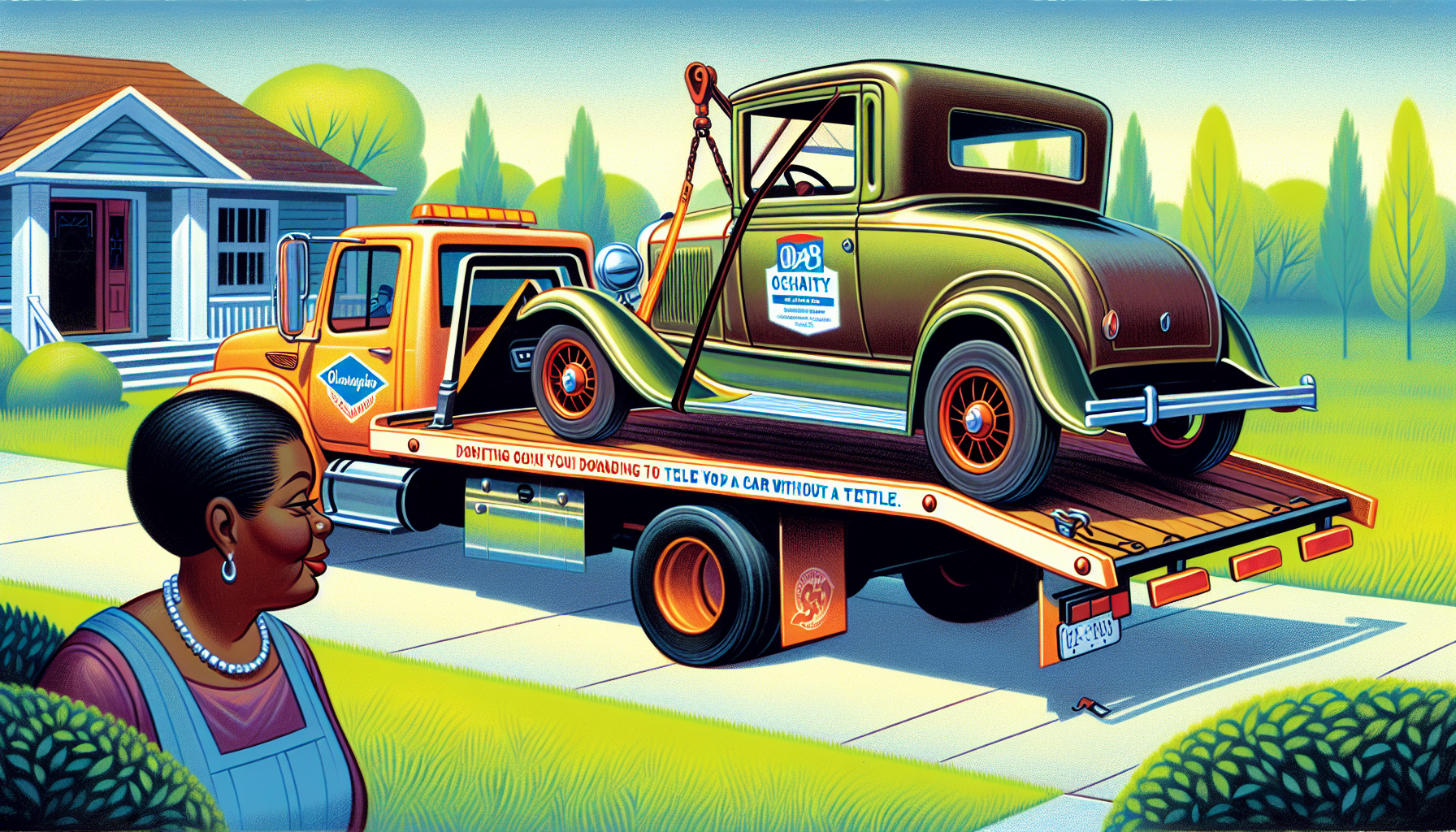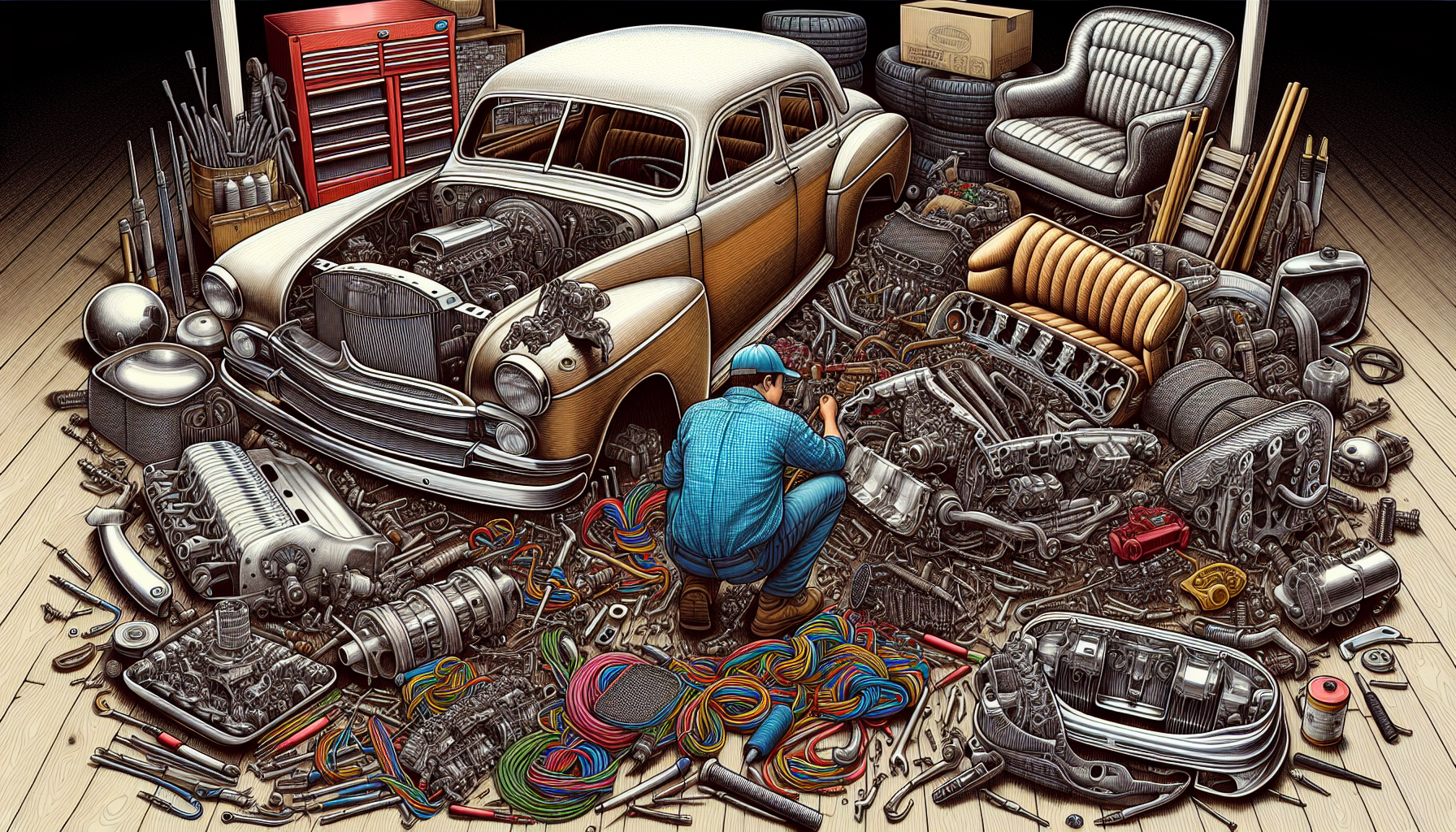Struggling with how to get rid of car without title? This no-fluff guide walks you through several practical solutions, whether you’ve lost your title or never had one. From obtaining a duplicate title to alternatives such as selling to a junkyard, donating, or parting out your car, we reveal the steps you can take to free up that space in your driveway legally and efficiently. Dive in to explore your options and get that title-less vehicle off your hands.
Key Takeaways
- A duplicate title can be obtained from the DMV by presenting proper documentation like a driver’s license and paying an application fee.
- Cars without titles can be sold to junkyards or private buyers with proper negotiation and documentation, or donated to charity for a potential tax deduction.
- As a last resort, a car can be dismantled for parts, which can be sold individually, with the remaining scrap metal being recycled responsibly.
Obtaining a Duplicate Title

Hold your horses before you declare it the end of the road! The most straightforward route to solving the missing title mystery is to obtain a duplicate from your local Department of Motor Vehicles (DMV). It’s like retracing your steps to find lost keys — a bit tedious, perhaps, but often successful. This path involves a few critical stops: contacting your friendly DMV officers, gathering a small mountain of paperwork, and parting with a bit of cash for the application fee.
We’ll delve into this site further.
Contact Your Local Department of Motor Vehicles (DMV)
The first step is quite simple: contact your local DMV. It’s like setting up a meeting with an old acquaintance, except this one can help you solve your title troubles. You’ll want to visit their website or flip through your local phone directory to find the nearest DMV office, armed with information about office hours and necessary documentation.
Reach out via phone, email, or even live chat, if available, to get the inside scoop on their title replacement process. Remember, each state is like a unique puzzle, and the DMV holds the pieces you need to complete the picture.
Gather Required Documents
Next, you’ll need to gather the required documents. Think of it as assembling the ingredients for a gourmet meal — each component is essential. You’ll need:
- A valid driver’s license or ID card as proof of identity
- The vehicle’s VIN and license plate number to ensure everything matches up
- Depending on your state, you might also need to show your insurance card or a statement from your lien holder.
This is no small matter, so double-check that list and make sure you’ve got everything in hand.
Pay the Application Fee
Finally, you’ll need to pay the piper — or in this case, the application fee, which can range from $20 to $35, depending on where you reside. While you might grumble about spending more money, think of it as an investment in your car’s afterlife. You can pay in cash, by check, or, in some cases, swipe your card. If you’re mailing your application, however, it’s checks or money orders only.
Agree to the fee, and you’re one step closer to waving goodbye to your car with a clean, free slate.
Selling Your Car to a Junkyard Without a Title

If the DMV route feels like a long and winding road, you might consider taking a shortcut by selling your car to a local junkyard. It’s like trading in your old, worn-out sneakers for some quick cash — no questions asked about the missing laces. You won’t fetch top dollar as you would with a title in hand, but you’ll be rid of the car faster than you can say ‘scrap metal.’
Before heading to the nearest junkyard, it’s important to strategize this less common approach.
Find a Reputable Junkyard
First things first: you’ll need to find a reputable junkyard that’s willing to take in your title-less chariot. It’s akin to finding a new home for a beloved pet — you want to ensure it’s a good one. Some junkyards are accustomed to buying junk cars without titles, as long as you can prove you’re the rightful owner with an old registration and driver’s license. Remember to confirm there are no liens on the vehicle, lest you find yourself in a sticky situation.
With a bit of research, you can easily find a local junkyard that will take your junk car off your hands.
Negotiate the Sale Price
Now, we need to discuss how to maximize the value of your metal. Assessing the value of your car’s parts is a crucial step in the negotiation process. Consider the rarity, condition, and market demand for each part. Are they as sought-after as the last slice of pizza at a party? Or are they more like that obscure VHS tape collecting dust in your attic? Knowing the worth of what you’re selling will give you the upper hand when it’s time to haggle with the buyer.
Complete the Sale and Removal Process
Once you’ve agreed on a price, it’s time to complete the sale and arrange for the vehicle to be removed. This is where things get official — a notarized bill of sale becomes your best friend, providing legal protection and documenting the transaction. Make sure the buyer understands that the car title is not available and agree on the terms for the car’s removal.
Draft a detailed bill of sale that lists all the pertinent details, and you’ll be ready to bid adieu to your four-wheeled friend.
Donating Your Car Without a Title

Perhaps your vehicle still has some good karma to give, and you’re feeling philanthropic. Donating your car to charity is a noble alternative that can benefit a good cause and potentially provide you with a tax deduction. It’s like giving your car a second life as a hero.
Some charities are equipped to handle donations without titles, willing to navigate the bureaucratic waters to apply for a replacement on your behalf. Before donating, we need to understand the details of this generous act.
Research Charitable Organizations
When looking to donate your car, you’ll want to do some homework on the charities that accept vehicles without titles. It’s a bit like matchmaking — you want to ensure your car’s legacy aligns with a charity whose mission you support. Inquire about how they’ll use the car and whether they handle donations directly or through a third party.
This research will not only help you find a suitable charity but also provide peace of mind that your car is in good hands.
Understand the Tax Deduction Process
Now, we need to grasp the financial benefits of donating your car. Understanding the tax deduction process is like navigating through a maze — it can be complex, but there’s a reward at the end. Here are some steps to follow:
- Verify the charity’s legitimacy on the IRS website.
- Familiarize yourself with itemizing your tax return.
- The deduction could be based on the fair market value or the actual sale price, but remember, the title status could influence the final amount.
Despite these intricacies, the tax benefits can be quite favorable, making it worth the effort.
Arrange for Vehicle Pick-Up
Once you’ve found your charitable match and wrapped your head around the tax details, it’s time to arrange for the vehicle pick-up. This process can usually be coordinated quickly, with most charities ready to tow away your contribution within a couple of days. Keep a record of everything, from the donation acknowledgment to the vehicle details, ensuring that every step is documented.
It’s like closing the chapter on your car’s story with a happy ending.
Selling Your Car to a Private Buyer Without a Title

Selling your car privately without a title is a bit like playing a game of trust — it requires transparency and a clear understanding of the rules. While you might find a buyer willing to take on the challenge, you’ll need to navigate this process with care to avoid legal pitfalls and ensure both parties are satisfied with the deal.
We need to understand the specifics of private sales without a title.
Be Transparent About the Lack of Title
Honesty is the best policy when it comes to selling your car privately without a title. It’s essential to be upfront with potential buyers about the situation to maintain their trust and protect your rights. Clear communication can prevent misunderstandings and legal issues down the road.
After all, nobody likes surprises, especially when it comes to buying a car.
Provide a Bill of Sale and Other Documentation
Providing a detailed bill of sale is crucial when selling your car. It’s like writing a mini-autobiography for your car, complete with all the critical facts and signatures. Notarizing the bill of sale may be necessary, and it’s wise to include additional documentation like service records to bolster the buyer’s confidence.
Presenting this paperwork is akin to handing over a clean, albeit title-less, slate.
Beware of Scams and Fraud
Vigilance is required in a private sale without a title to protect yourself from scams and fraud. It’s like walking through a marketplace with your wallet exposed — you need to be aware of who’s around you and where your money is going. Meeting buyers in person, verifying their identity, and ensuring payments are fully processed are crucial steps to protect yourself and your car.
Don’t be fooled by offers that seem too good to be true or payment methods that raise red flags.
Dismantling Your Car for Parts

If you’re feeling industrious and environmentally conscious, dismantling your car for parts can be both profitable and eco-friendly. It’s like giving your car a transformative spa treatment where every piece finds a new purpose. By breaking down your vehicle, you can recover valuable parts and materials, ensuring they continue to serve long after the car has driven its last mile.
Assess the Value of Your Car’s Parts
Before you start unscrewing and unbolting, take a moment to assess the value of your car’s parts. It’s like appraising a treasure chest — you need to know what’s worth the most and what can be easily sold. By understanding the compatibility, condition, and demand for the parts, you’ll have a clearer picture of their worth and how to price them effectively.
Advertise and Sell Parts Online
With your car parts appraised, it’s time to connect with users looking to buy. Online platforms and websites on the internet like eBay and Facebook Marketplace offer the virtual storefront you need to reach a wide audience. Crafting clear, detailed descriptions and snapping high-quality images will make your parts stand out.
It’s like posting a personal ad for each piece, ensuring they catch the eye of the right suitor.
Dispose of Remaining Scrap Metal Responsibly
Once you’ve sold the valuable parts, you’ll be left with the remains — the scrap metal. Recycling this metal is more than just tidying up; it’s a significant environmental contribution. By responsibly disposing of the scrap, you’re helping to reduce pollution and conserve resources, ensuring that your car’s final act is a green one.
Summary
As we pull into the final stretch of our journey, it’s clear that there’s more than one road to success when you’re looking to get rid of a car without a title. Whether you choose to obtain a duplicate title, sell to a junkyard, donate to charity, find a private buyer, or dismantle the car for parts, each path offers unique benefits and challenges. Remember, with a bit of knowledge and the right approach, you can turn this seemingly complicated situation into a smooth ride.
Frequently Asked Questions
Can I get a duplicate title online and how long will it take to receive it?
Yes, you can order a duplicate title online, and it will be mailed by the second business day if you place your order before 8 pm on a business day. Orders made on weekends or state holidays will be processed the next business day.
What documents do I need to sell my car to a junkyard without a title?
You’ll need to show proof of ownership, such as an old registration and your driver’s license, and make sure there are no liens on the vehicle before selling it to a junkyard.
How can I ensure a private car sale without a title is secure?
To ensure a secure private car sale without a title, be transparent about the lack of title, provide a notarized bill of sale, and meet the buyer in person to verify their identity and ensure valid payment.
Is it possible to claim a tax deduction for donating a car without a title?
Yes, you can claim a tax deduction for donating a car without a title as long as you itemize your tax return and the charity uses or sells the vehicle.
How do I dispose of the remaining scrap metal after dismantling my car for parts?
You can dispose of the remaining scrap metal by recycling it at a local junkyard or recycling center, which helps promote environmental sustainability.
For more information, visit https://www.carmula.com/





 Who We Are
Who We Are Coverage Area
Coverage Area Donate
Donate